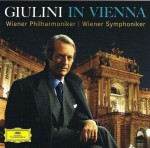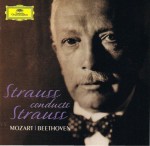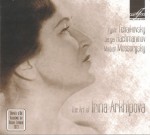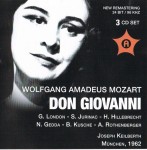Old Wine, New Bottles | Fine Old Recordings Re-Released - June 2014
When Carlo Maria Giulini died in 2005 the music world lost one of the last supreme conductors of the second half of the 20th century. Giulini was born in Barletta, Italy in 1914 and began violin lessons at the age of five, later switching to viola. In 1932 he auditioned and was accepted as a member of the viola section of Italy’s foremost orchestra at the time, the Orchestra dell’Accademia di Santa Cecilia in Rome. There he played under Fritz Reiner, Victor de Sabata, Pierre Monteux, Wilhelm Furtwangler, Richard Strauss and others including Bruno Walter. In 1944 he was appointed conductor of the Italian Radio (RAI) Orchestra. A performance of La Mer impressed Arturo Toscanini who had heard the broadcast. The two met and formed a firm, lasting friendship and Toscanini recommended Giulini to La Scala where he became assistant to the great Victor de Sabata, whom he succeeded as musical director in 1953.
 It is axiomatic that the first items in any program should not be showstoppers but DG does that in this set (Giulini in Vienna 479 2688, 15 CDs) with unmatched performances of three Beethoven piano concertos, the First, Third and Fifth, played by Arturo Benedetti Michelangeli with the Vienna Symphony Orchestra. Recorded live in 1979 in the Musikverein, Michelangeli is in winning form, magisterial, dynamic, probing and articulate, as is the orchestra.
It is axiomatic that the first items in any program should not be showstoppers but DG does that in this set (Giulini in Vienna 479 2688, 15 CDs) with unmatched performances of three Beethoven piano concertos, the First, Third and Fifth, played by Arturo Benedetti Michelangeli with the Vienna Symphony Orchestra. Recorded live in 1979 in the Musikverein, Michelangeli is in winning form, magisterial, dynamic, probing and articulate, as is the orchestra.
The next five discs are devoted to the four Brahms symphonies, the Tragic Overture, the Haydn Variations and the German Requiem, all recorded in the Musikverein with the Vienna Philharmonic. I was not looking forward to the symphonies for, as some readers may have intuited, I am weary of hearing them. Listening to the First renewed my enthusiasm for the work however. This is played not as a “Beethoven Tenth” but a Brahms First. It is quite formal and beautifully laid out, with no deliberate emphasis on this phrase or that or by retarding or accelerating to make a point. This performance vividly recalled my unexpected euphoria at first hearing the work so many years ago. His performance of the Requiem is right on the money, with a strong pulse drawing together the seven sections featuring soprano Barbara Bonney, baritone Andreas Schmidt, and the choir of Vienna State Opera. His balancing of choir, soloists and orchestra is exemplary, although one must acknowledge the art of the engineers at getting just so on this very impressive recording of 1987. Three Giulini Bruckner symphonies, Seven, Eight and Nine, have had a devoted following since their initial release and the sound on these reissues is of demonstration quality. The two Liszt Piano Concertos with Lazar Berman and the Vienna Symphony deserve their inclusion as does the 1979 complete Rigoletto with Domingo, Cotrubas, Ghiaurov, Obraztsova, et al. and the Vienna Philharmonic. The final work in this set is the 1973 cantata An die Nachgeborenen (To Posterity) by Gottfried von Einem, his most important work. There are nine sections in this unusual and moving piece with texts from Bertholt Brecht, the Psalms, Hölderlin and Sophocles. Featured are mezzo Julia Hamari, Dietrich Fischer-Dieskau, the Vienna Singverein and the Vienna Symphony, recorded in 1975. Without exception, all the interpretations and performances in this collection are of enduring stature, offered in the finest sound that makes the repertoire doubly satisfying.
I have enjoyed the following fine old wines in new bottles over the last little while and pass them along for your summer listening:
 Among the many collections issued to celebrate the 150th anniversary of the birth of Richard Strauss is the DG compilation of their recordings of the composer conducting his own works and others (Strauss conducts Strauss, 479 2703, 7 CDs). Included are all the Strauss tone poems including two Don Quixotes and waltz sequences from Acts II and III of Der Rosenkavalier. He seems to ignore his quoted advice to conductors, “Play everything twice as fast” and “Don’t look at the brass, it only encourages them.” Included are Mozart’s last three symphonies and Beethoven’s Fifth and Seventh; also overtures by Gluck, Weber, Wagner and Cornelius. From way back in 1921 Strauss plays piano for fabled baritone Heinrich Schlusnus in four lieder. The sound is bright and dynamic throughout featuring the Berlin Philharmonic, the Staatskapelle Berlin and the Bayerisches Staatskapelle. Low price, high recommendation.
Among the many collections issued to celebrate the 150th anniversary of the birth of Richard Strauss is the DG compilation of their recordings of the composer conducting his own works and others (Strauss conducts Strauss, 479 2703, 7 CDs). Included are all the Strauss tone poems including two Don Quixotes and waltz sequences from Acts II and III of Der Rosenkavalier. He seems to ignore his quoted advice to conductors, “Play everything twice as fast” and “Don’t look at the brass, it only encourages them.” Included are Mozart’s last three symphonies and Beethoven’s Fifth and Seventh; also overtures by Gluck, Weber, Wagner and Cornelius. From way back in 1921 Strauss plays piano for fabled baritone Heinrich Schlusnus in four lieder. The sound is bright and dynamic throughout featuring the Berlin Philharmonic, the Staatskapelle Berlin and the Bayerisches Staatskapelle. Low price, high recommendation.
 I was first aware of the Russian mezzo, Irina Arkhipova from the 1963 recording of the Bolshoi’s Boris Godunov which I bought for George London’s Boris. She sings Marina and the Act III duet with Dimitri, building to her adoring and close-to-sublime No, no Tsarevich, I beg you, which is unequaled. Melodyia has issued The Art of Irina Arkhipova (MEL CD 10 2123) in which she sings songs by Tchaikovsky, Six French Songs, Op.65 and Six Romances, Op.73; seven songs by Rachmaninoff and Mussorgsky’s Songs and Dances of Death. I do not understand Russian but I find sung Russian very pleasing and satisfying, hence I have no idea of the English translations but, regardless, I continue to listen to these songs for the pleasure of hearing her voice. But, as they say in the ads, your mileage may vary.
I was first aware of the Russian mezzo, Irina Arkhipova from the 1963 recording of the Bolshoi’s Boris Godunov which I bought for George London’s Boris. She sings Marina and the Act III duet with Dimitri, building to her adoring and close-to-sublime No, no Tsarevich, I beg you, which is unequaled. Melodyia has issued The Art of Irina Arkhipova (MEL CD 10 2123) in which she sings songs by Tchaikovsky, Six French Songs, Op.65 and Six Romances, Op.73; seven songs by Rachmaninoff and Mussorgsky’s Songs and Dances of Death. I do not understand Russian but I find sung Russian very pleasing and satisfying, hence I have no idea of the English translations but, regardless, I continue to listen to these songs for the pleasure of hearing her voice. But, as they say in the ads, your mileage may vary.
 From the very first bars of the overture, you know that the live 1962 Don Giovanni from Munich conducted by Joseph Keilberth with the Bayerisches Staatskapelle will be spectacular! Here is the cast: George London (Giovanni), Gottlob Frick (Commendatore), Hildegard Hillebrecht (Donna Anna), Nicolai Gedda (Don Ottavio), Sena Jurinac (Donn’Elvira), Benno Kusche (Leporello), Albrecht Peter (Masetto) and Anneliese Rothenberger (Zerlina). A dream cast if there ever was one and it is a truly sparkling performance. It’s on Andromeda (ANDRCD 918, 3 CDs) and very inexpensive. Dynamic live sound…not a note is wasted or unheard. A must-have.
From the very first bars of the overture, you know that the live 1962 Don Giovanni from Munich conducted by Joseph Keilberth with the Bayerisches Staatskapelle will be spectacular! Here is the cast: George London (Giovanni), Gottlob Frick (Commendatore), Hildegard Hillebrecht (Donna Anna), Nicolai Gedda (Don Ottavio), Sena Jurinac (Donn’Elvira), Benno Kusche (Leporello), Albrecht Peter (Masetto) and Anneliese Rothenberger (Zerlina). A dream cast if there ever was one and it is a truly sparkling performance. It’s on Andromeda (ANDRCD 918, 3 CDs) and very inexpensive. Dynamic live sound…not a note is wasted or unheard. A must-have.


